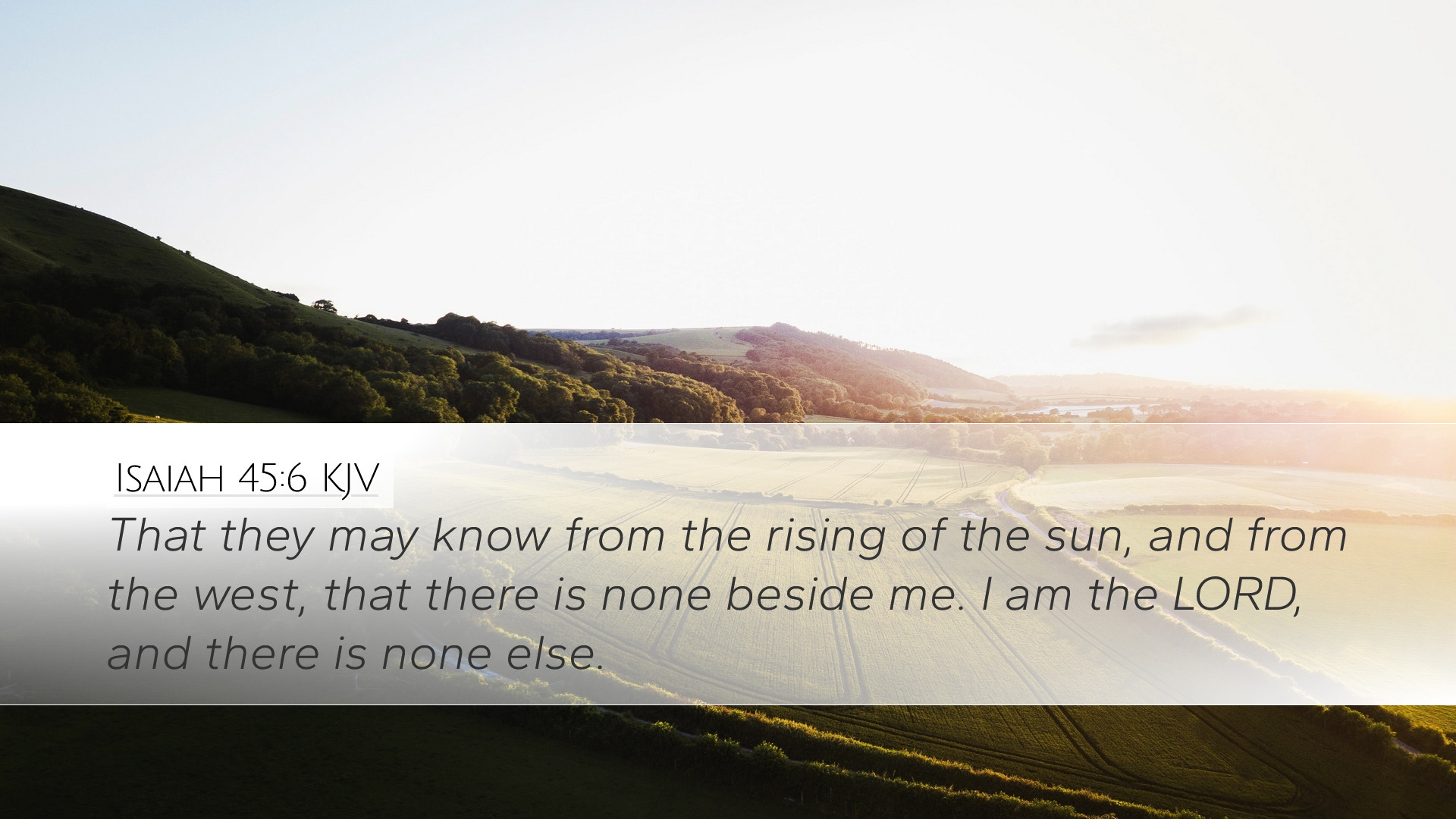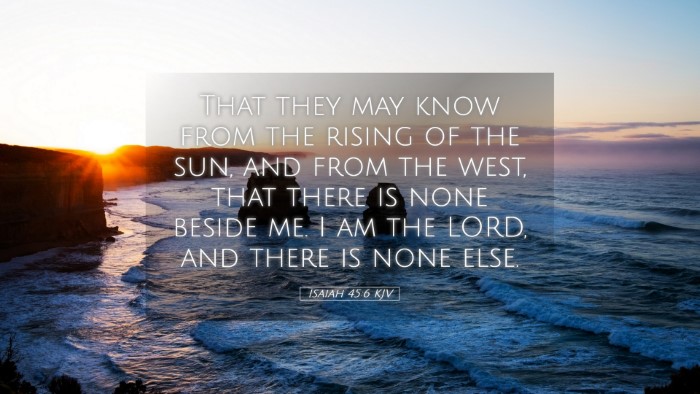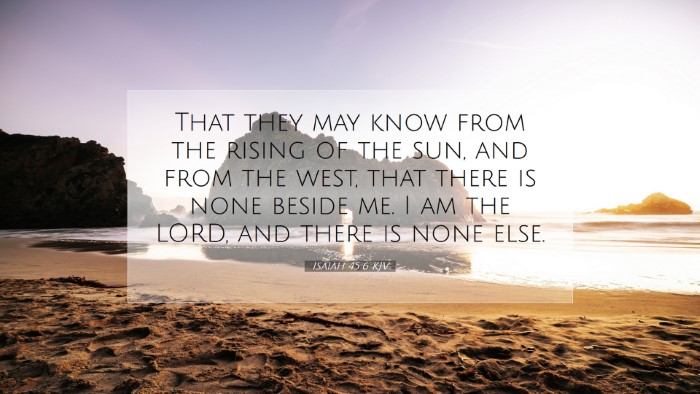Commentary on Isaiah 45:6
This verse, Isaiah 45:6, states: "That they may know from the rising of the sun, and from the west, that there is none beside me. I am the Lord, and there is none else." This profound declaration emphasizes the uniqueness and sovereignty of God. Below, we present a summary of insights from noted public domain commentaries to enrich the understanding of this text.
Overview of the Context
Isaiah, a major prophet of the Old Testament, delivered messages that were not only relevant for his time but also prophetic for future generations. This particular verse fits within a larger narrative where God asserts His sovereignty over all creation and nations. Understanding the historical context, where Israel faced the challenge of idolatry and the allure of foreign powers, helps illuminate the significance of this proclamation.
Insights from Public Domain Commentaries
Matthew Henry's Commentary
Matthew Henry emphasizes the following themes in his commentary on this verse:
- God’s Sovereignty: Henry highlights that God’s declaration serves to affirm His ultimate authority. The assertion that there is "none beside me" stresses the uniqueness of Yahweh in contrast to the false gods of the surrounding nations.
- The Revelation of God's Nature: The verse calls people to recognize God's attributes from the "rising of the sun" to the "west." This imagery encapsulates the universality of God's rule—extending from east to west, signifying that His reign encompasses all creation.
- Understanding Through Prophecy: Henry points out that God's framing of His supremacy is also a prophetic statement, intending to prepare His people for the coming of Cyrus the Great as an instrument of His plan—a foreshadowing of God's use of secular leaders for divine purposes.
Albert Barnes' Notes on the Bible
Albert Barnes, in his analytical approach, provides additional insights:
- The Purpose of Knowledge: Barnes argues that the purpose outlined in the phrase "that they may know" implies an active understanding. It is not merely cognitive but transformative, calling nations to awareness of their Creator and Redeemer.
- The Known and Unknown: He emphasizes that in a world rife with idolatry, God desires to be known, suggesting that ignorance of God's truth brings about spiritual blindness and disarray.
- The Nature of God: Barnes explains that this verse constitutes a doctrinal statement about God's nature. Not only is God sovereign, but He also invites humanity to come to Him, dispelling myths of dualism where evil forces contend with divine sovereignty.
Adam Clarke's Commentary
Adam Clarke provides a theological perspective on this verse:
- The Comprehensive Nature of God's Rule: Clarke interprets the east-west motif as signifying the geographic and spiritual realms. Here, all nations are included in God's plan, indicating His universal lordship beyond Israel.
- The Call to Repentance and Recognition: Clarke notes that this assertion serves as both comfort for Israel and a warning to others. It is an invitation to recognize the futility of idols and to return to the one true God.
- The Certainty of God's Promises: Clarke reflects on how God's proclamation reassures believers of His providence and control over their circumstances, irrespective of the tumultuous events they may face.
Theological Implications
From the combined insights of the above commentaries, several theological implications arise:
- Monotheism: This verse stands as a strong defense of monotheism in a world inclined towards pluralism. The assertion that "there is none else" challenges the worldview that accommodates multiple deities.
- God's Immanence and Transcendence: This scripture encapsulates the duality of God's nature—transcendent over creation while being immanently involved with humanity, guiding nations towards the knowledge of Him.
- God’s Sovereign Plan: The preparation of the world for the coming Messiah is echoed here. God's sovereignty is directed towards the ultimate redemption narrative that culminates in Jesus Christ.
Applications for Today
Pastors, students, theologians, and Bible scholars can draw several applications from Isaiah 45:6:
- Proclaiming God’s Uniqueness: In a diverse and pluralistic society, Christians are called to proclaim the uniqueness of God as the only source of truth, salvation, and hope.
- Encouraging Faith in Difficult Times: Just as Isaiah asserted God's sovereignty in challenging circumstances, believers today can be assured of God's presence and control regardless of external pressures.
- Fostering a Renewed Knowledge of God: Efforts in teaching and preaching should lead to a deeper understanding of who God is, encouraging both personal and communal recognition of His sovereignty and grace.
Conclusion
Isaiah 45:6 is a powerful reminder of God's sovereignty and uniqueness. The insights gathered from the commentaries of Matthew Henry, Albert Barnes, and Adam Clarke provide a rich tapestry of theological insights applicable both in the ancient context of Israel and in contemporary faith practice. As we reflect on this verse, may we be moved to declare the greatness of our God and invite others into the relationship He offers.


